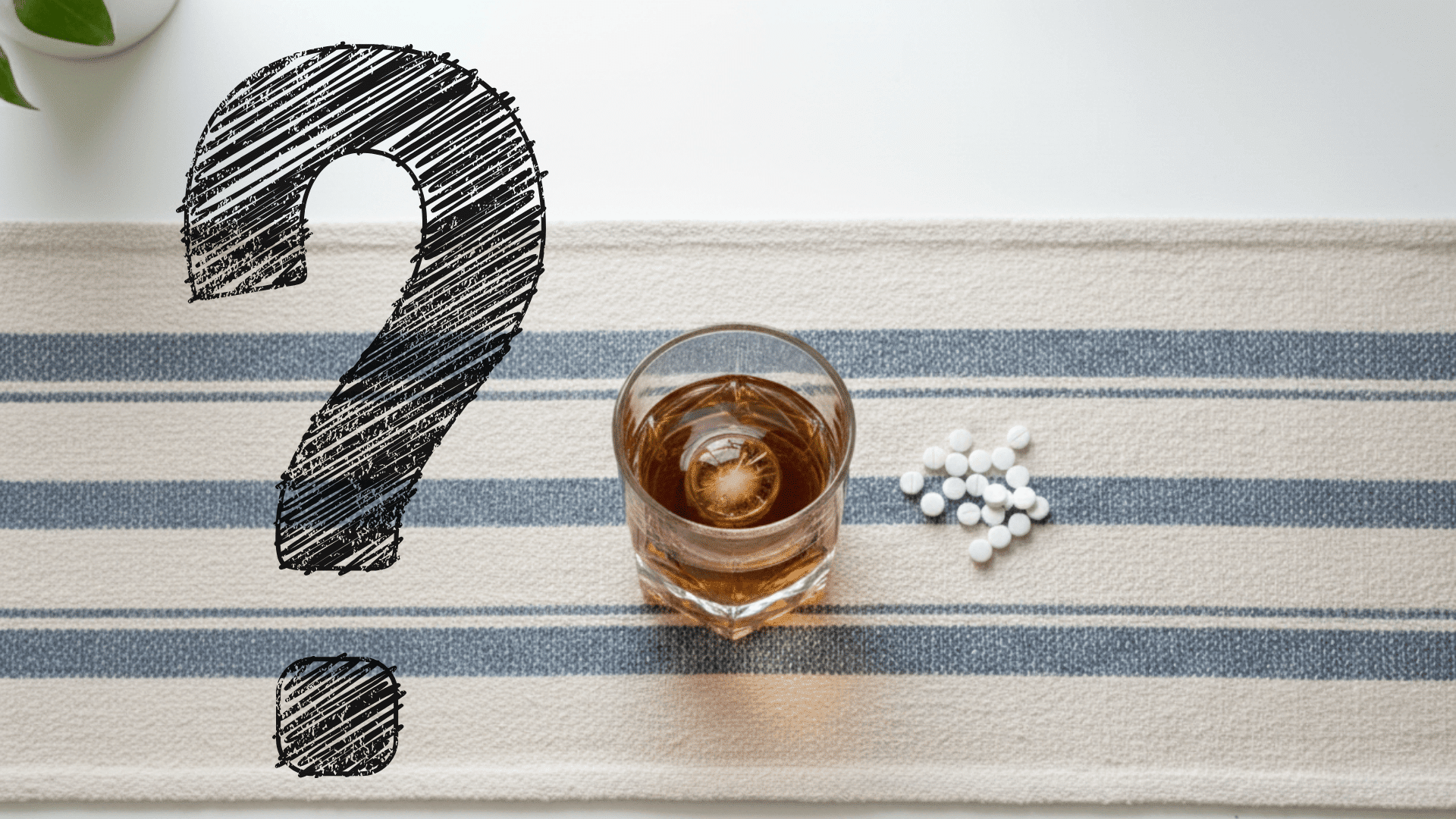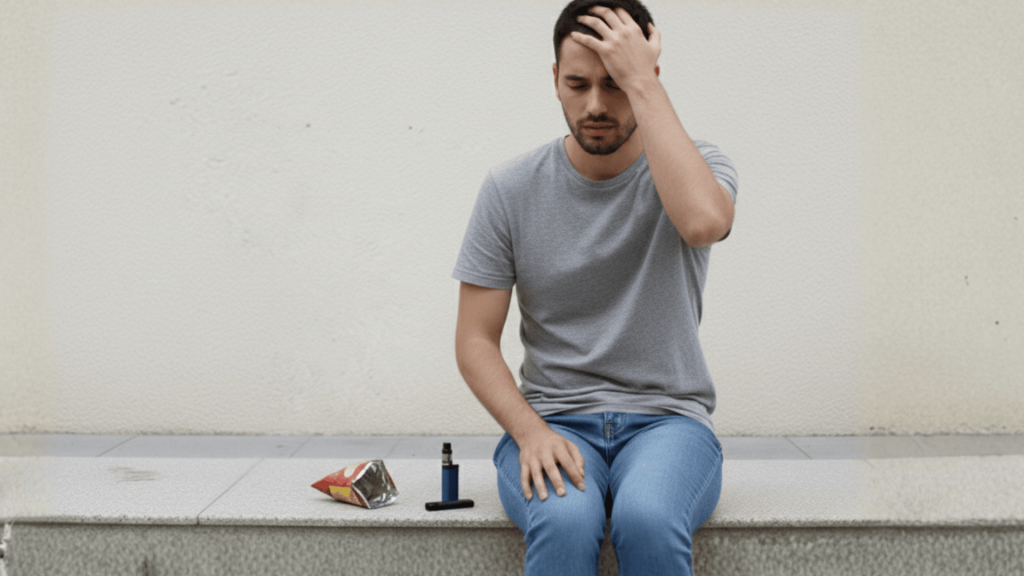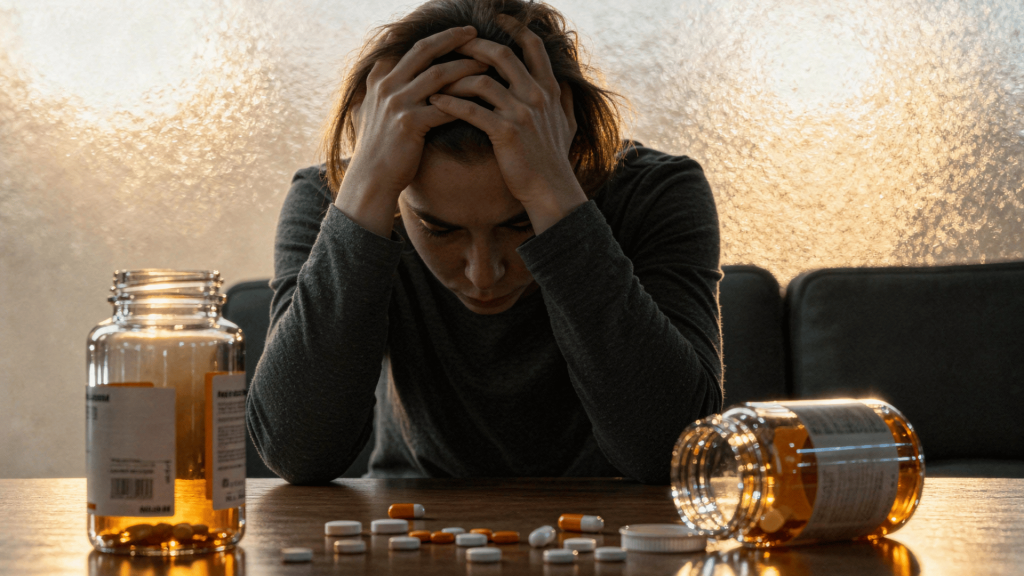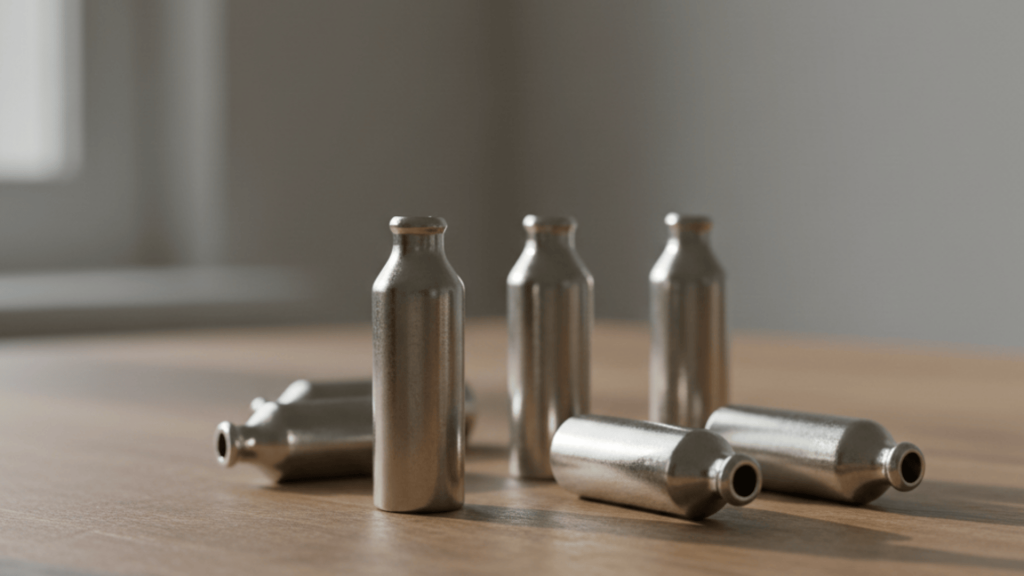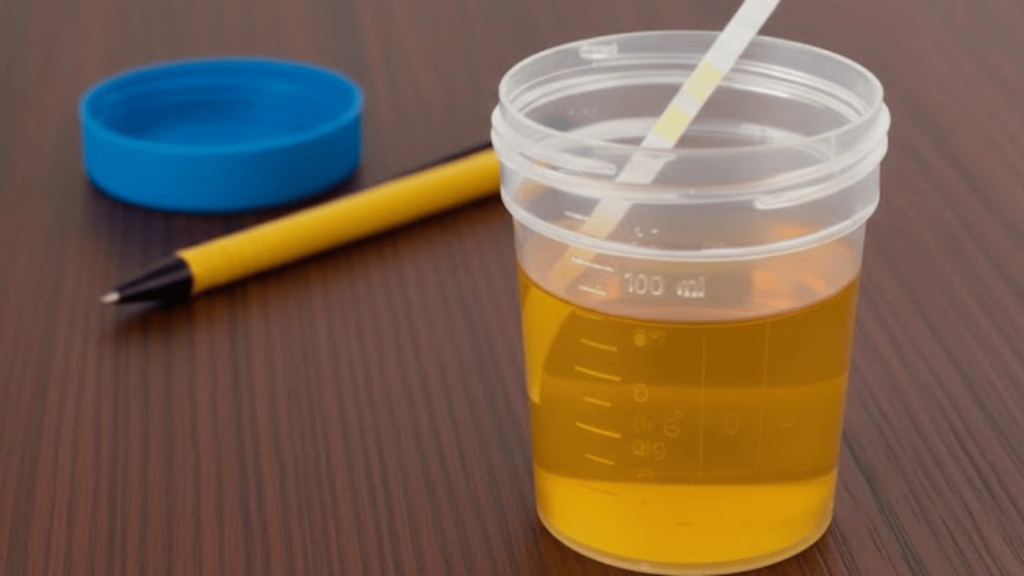I’ve heard this question so many times: “Can I have a drink while I’m on antibiotics?” It’s one of those health myths that everyone seems to have an opinion on, yet nobody’s quite sure what’s actually true.
Maybe you’ve been prescribed antibiotics and have a dinner party coming up, or you’re simply curious about whether that glass of wine will really cause a problem.
In this post, I’m going to walk you through what really happens when you mix alcohol with antibiotics. We’ll look at which combinations are genuinely risky, what the research actually shows, and when you absolutely need to skip that cocktail.
I’ll also share practical tips to help you stay safe during your treatment. Of course, your specific situation matters, so always check with your healthcare provider about your particular medications and health conditions.
What Amoxicillin is & How it Works
Amoxicillin belongs to the penicillin family of antibiotics, making it one of the most widely prescribed medications worldwide.
I see it used for treating common bacterial infections like strep throat, ear infections, urinary tract infections, and certain respiratory conditions. It’s a go-to choice for many doctors because it’s effective and generally well-tolerated.
Once you take amoxicillin, your body absorbs it quickly through your digestive system. It then travels through your bloodstream to the infection site, where it works by disrupting bacterial cell walls, essentially causing the bacteria to break apart and die.
Your kidneys process and eliminate the medication within several hours, which is why you need to take multiple doses throughout the day to maintain effective levels.
Does Alcohol Interact Directly With Amoxicillin?
Here’s some good news: research shows no direct interaction between amoxicillin and alcohol.
Studies examining the pharmacokinetics of penicillin antibiotics found that alcohol doesn’t influence their absorption or elimination (Fact versus Fiction: a Review of the Evidence behind Alcohol and Antibiotic Interactions – PMC). This means that having a drink won’t stop amoxicillin from doing its job of fighting bacteria.
However, before you pour that glass of wine, there’s an important distinction to understand.
While alcohol doesn’t interfere with how amoxicillin works, it can worsen the medication’s side effects and potentially slow your body’s healing process.
When healthcare providers recommend moderation, they typically mean limiting yourself to one standard drink or avoiding alcohol altogether until you’re feeling better and your infection has cleared.
Shared Side Effects & How Alcohol May Worsen Them
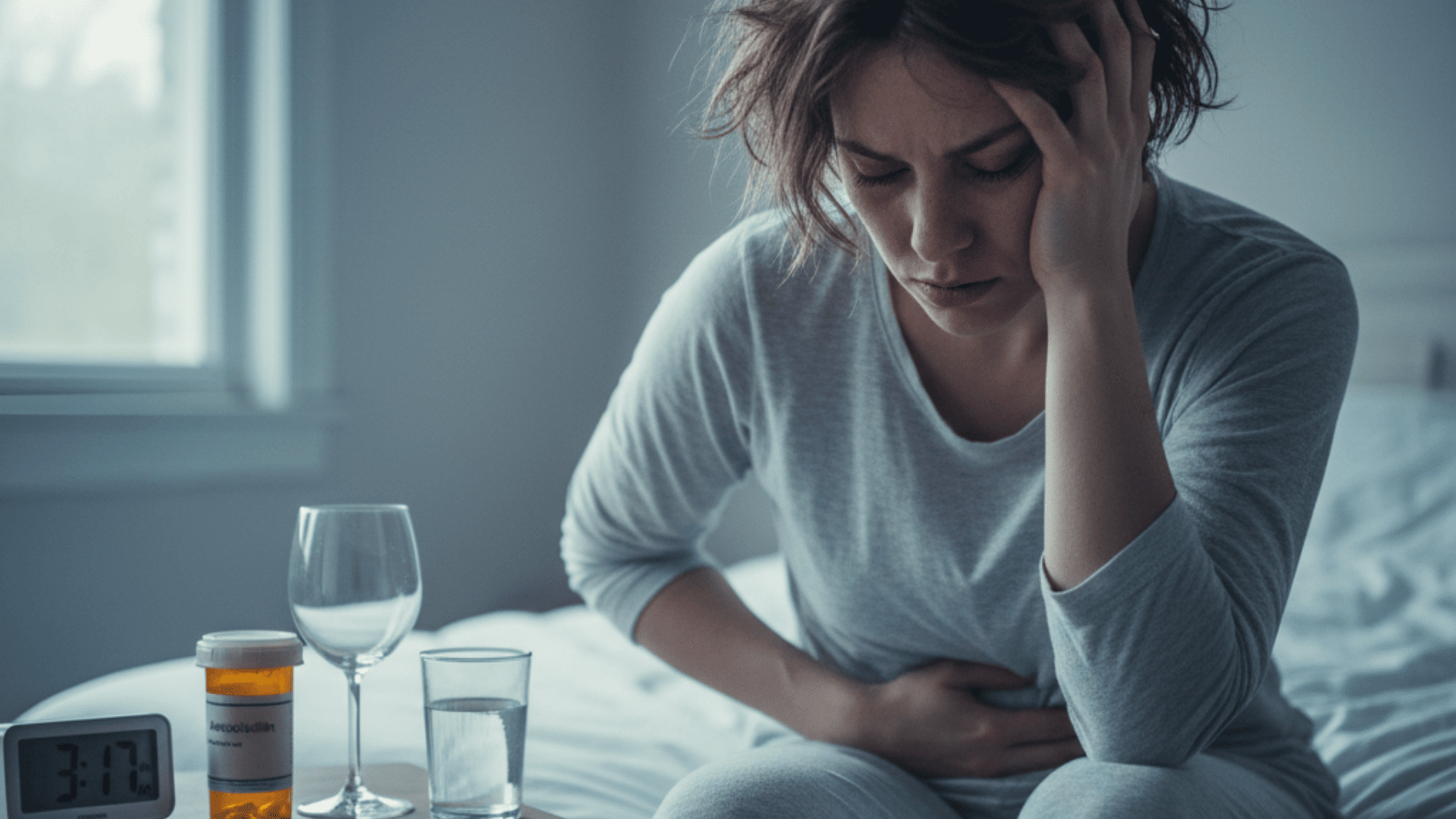
Both amoxicillin and alcohol can produce similar side effects on their own. When combined, these effects don’t just add up; they can actually amplify each other, making you feel considerably worse during your recovery.
1. Gastrointestinal Distress
Nausea, vomiting, and stomach upset are among the most common side effects people experience when taking amoxicillin.
Alcohol is known to irritate the stomach lining and can significantly worsen these gastrointestinal symptoms when mixed with antibiotics. When you drink alcohol while on amoxicillin, you’re essentially doubling down on stomach irritation.
Your body produces acetaldehyde when breaking down alcohol, which can intensify feelings of nausea, making an already uncomfortable situation much harder to tolerate.
Immediate Symptom: Intensified nausea and increased likelihood of vomiting, potentially preventing proper absorption of your medication.
2. Diarrhea and Dehydration
Diarrhea is another frequent side effect of amoxicillin, and it can sometimes persist for weeks after treatment. Alcohol acts as a diuretic, increasing urination and contributing to dehydration.
When you combine alcohol with amoxicillin-induced diarrhea, you’re facing a double dehydration threat.
Proper hydration is essential for distributing antibiotics throughout your body and helping your kidneys process the medication effectively. Dehydration can leave you feeling weak and exhausted, significantly slowing your recovery process.
Immediate Symptom: Excessive fluid loss leading to dark urine, extreme thirst, dizziness, and prolonged weakness.
3. Sleep Disruption and Delayed Recovery
While alcohol might initially make you drowsy, it actually disrupts your sleep architecture, particularly REM sleep, which is crucial for healing.
Getting adequate rest is fundamental to recovery from infection, and alcohol interferes with the restorative sleep your body desperately needs. Your immune system does much of its repair work during deep sleep cycles.
When alcohol disrupts these cycles, your body can’t fight the infection as effectively, potentially extending how long you stay sick and making your symptoms linger longer than necessary.
Immediate Symptom: Poor sleep quality despite feeling tired, leading to prolonged fatigue and slower recovery from your infection.
Healing & Immune System Considerations
When you’re battling an infection, your body is already working overtime. Adding alcohol to the mix doesn’t just slow things down; it actively works against everything your body is trying to accomplish while on antibiotics.
- Alcohol temporarily suppresses your immune response by reducing white blood cell production and impairing the inflammatory response needed to contain infections.
- Alcohol disrupts sleep architecture and REM cycles, interfering with the deep sleep phases when your body does most of its healing and immune system repair work.
- Proper hydration supports immune function and helps deliver antibiotics to infected tissues, but alcohol’s diuretic effect counteracts these benefits and slows healing.
- Alcohol prevents your body from properly absorbing essential nutrients and zaps your energy levels, reducing your body’s ability to heal from infection.
- Your body prioritizes processing and eliminating alcohol, diverting metabolic energy away from the resources needed to fight your bacterial infection.
Here’s what this really means: while amoxicillin attacks the bacteria, your immune system is doing the heavy lifting to actually clear the infection.
When you drink, you’re essentially tying one arm behind your body’s back, right when it needs to be at full strength. The result? You’ll likely stay sick longer and feel worse in the meantime.
When Alcohol is More of a Risk
While moderate alcohol might not cause severe reactions with amoxicillin for most people, certain health conditions and circumstances significantly increase your risk of complications.
Knowing when you’re in a higher-risk category can help you make safer choices.
| Risk Factor | Risk Level | Primary Concern | Recommended Action |
|---|---|---|---|
| Pre-existing Liver Disease | High | Both alcohol and medication stress compromise the liver | Avoid alcohol completely |
| History of Alcohol Misuse | High | Increases liver injury susceptibility | Abstain entirely during treatment |
| Multiple Medications | Moderate-High | Higher risk of complications; interactions with blood thinners, birth control | Review the full medication list with the doctor |
| Age Over 55 | Moderate | Significantly increased liver injury risk | Consider avoiding alcohol |
| Kidney Disease or Other Conditions | Moderate | Increased vulnerability to side effects | Follow the provider’s specific guidance |
Seek immediate medical attention if you experience difficulty breathing, facial swelling, persistent vomiting, severe stomach cramps, or worsening infection symptoms after mixing alcohol with amoxicillin.
Practical Guidelines & What Doctors Often Recommend
When it comes to drinking alcohol while on amoxicillin, medical advice varies based on your individual situation. Here’s what healthcare providers typically recommend to help you make the safest choice during your treatment.
- Most health professionals recommend avoiding alcohol entirely during treatment, though moderation is key if you choose to drink.
- Unlike some antibiotics, there’s no waiting period after finishing amoxicillin before you can drink.
- Alcohol causes dehydration and disrupts sleep, both essential for healing; stay hydrated and rest well.
- Avoid binge drinking entirely: Heavy consumption increases side effects and weakens your immune system.
- Maintain a nutritious diet, as alcohol prevents nutrient absorption and depletes energy.
The bottom line is simple: while an occasional drink might not cause serious harm for most people, your body heals best when you skip alcohol during treatment.
Mixing Alcohol with Antibiotics: Myths & Misconceptions

There’s a lot of conflicting information out there about mixing alcohol with antibiotics, and amoxicillin is no exception. Let’s separate fact from fiction and clarify what the science actually tells us.
Myth 1: Alcohol Completely Cancels Out Amoxicillin’s Effectiveness
Fact: Studies show that alcohol doesn’t directly interfere with how amoxicillin works to kill bacteria (PubMed Central). However, alcohol can weaken your immune system and slow your body’s healing process, potentially prolonging your illness.
Myth 2: One Drink is Perfectly Safe and Has No Impact Whatsoever
Fact: While one drink may not cause severe reactions, alcohol can still worsen common side effects like nausea, vomiting, and dizziness. Even small amounts can contribute to dehydration and interfere with the rest your body needs to recover fully.
Myth 3: You Must Wait Days After Finishing Amoxicillin Before Drinking
Fact: Unlike certain antibiotics like metronidazole, there’s no mandatory waiting period after finishing amoxicillin before you can drink alcohol. However, it’s still wise to wait until you’re feeling better and your infection has fully cleared before resuming alcohol consumption.
Signs You Should Call a Doctor
While most people tolerate amoxicillin well, certain symptoms require immediate medical attention. Don’t hesitate to reach out to your healthcare provider if you experience any of the following warning signs.
- Severe or bloody diarrhea, stomach cramps with blood or mucus in stool, or diarrhea lasting more than two days may indicate a serious intestinal condition.
- Difficulty breathing, swelling of face/lips/tongue, severe hives, or wheezing; these are signs of a serious allergic reaction requiring emergency care.
- Your symptoms don’t improve after three to five days of treatment, or they get worse despite taking the antibiotic as prescribed.
- Yellowing of skin or eyes, dark urine, pale stools, or unusual bruising; potential signs of liver or gallbladder problems.
- Cloudy or bloody urine, severe swelling, or any unusual symptoms that concern you warrant a call to your healthcare provider.
Remember, it’s always better to err on the side of caution. If something feels seriously wrong or you’re experiencing symptoms that worry you, contact your doctor immediately or call emergency services.
Resources & References
If you’re looking to learn more about this topic, there are some excellent evidence-based resources available.
The medical journal Antimicrobial Agents and Chemotherapy published a comprehensive review examining the evidence behind alcohol and antibiotic interactions, which offers valuable insights into what the research actually shows.
For general guidance on antibiotics and alcohol, the Mayo Clinic provides clear, reliable information based on current medical understanding.
Remember, while these sources offer valuable information, nothing replaces a conversation with your own healthcare provider who understands your unique situation and can give you personalized advice.
The Bottom Line
So, can you drink alcohol while taking amoxicillin? The answer isn’t a simple yes or no.
While alcohol won’t directly stop your antibiotic from working, it can make your recovery harder by worsening side effects, disrupting sleep, and weakening your immune system.
Your best bet is to prioritize healing and skip the drinks until you’ve finished your course and feel better.
Everyone’s situation is different, so when in doubt, have that conversation with your healthcare provider; they’re there to help you make the safest choice for your health.
Have you had experience with taking antibiotics and alcohol? What worked for you? I’d love to hear your thoughts and questions in the comments below!

